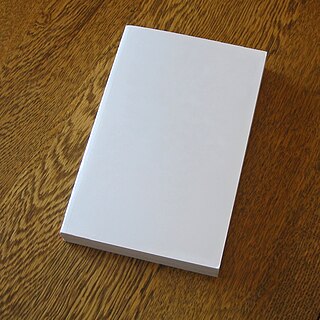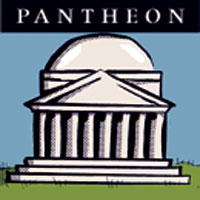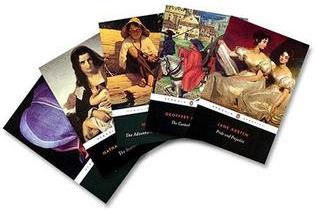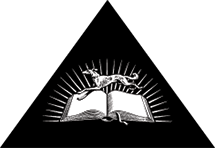
A paperback book is one with a thick paper or paperboard cover, and often held together with glue rather than stitches or staples. In contrast, hardcover (hardback) books are bound with cardboard covered with cloth, leather, paper, or plastic.
Doubleday is an American publishing company. It was founded as the Doubleday & McClure Company in 1897 and was the largest in the United States by 1947. It published the work of mostly U.S. authors under a number of imprints and distributed them through its own stores. In 2009 Doubleday merged with Knopf Publishing Group to form the Knopf Doubleday Publishing Group, which is now part of Penguin Random House. In 2019, the official website presents Doubleday as an imprint, not a publisher.

Ballantine Books is a major book publisher located in the United States, founded in 1952 by Ian Ballantine with his wife, Betty Ballantine. It was acquired by Random House in 1973, which in turn was acquired by Bertelsmann in 1998 and remains part of that company today. Ballantine's original logo was a pair of mirrored letter Bs back to back, while its current logo is two Bs stacked to form an elaborate gate. The firm's early editors were Stanley Kauffmann and Bernard Shir-Cliff.

Penguin Books is a British publishing house. It was co-founded in 1935 by Allen Lane with his brothers Richard and John, as a line of the publishers The Bodley Head, only becoming a separate company the following year. Penguin revolutionised publishing in the 1930s through its inexpensive paperbacks, sold through Woolworths and other stores for sixpence, bringing high-quality fiction and non-fiction to the mass market. Its success showed that large audiences existed for serious books. It also affected modern British popular culture significantly through its books concerning politics, the arts, and science.

McClelland & Stewart Limited is a Canadian publishing company. It is owned by Penguin Random House of Canada, a branch of Penguin Random House, the international book publishing division of German media giant Bertelsmann.

The Stories of Vladimir Nabokov is a posthumous collection of every known short story that Vladimir Nabokov ever wrote, with the exception of "The Enchanter". In the current printing of this work, sixteen stories not previously published in English are translated by the author's son, Dmitri Nabokov. The collection was first published in America by Alfred A. Knopf in 1995.

Pantheon Books is an American book publishing imprint with editorial independence. It is part of the Knopf Doubleday Publishing Group.

Alfred A. Knopf, Inc. is an American publishing house that was founded by Alfred A. Knopf Sr. and Blanche Knopf in 1915. Blanche and Alfred traveled abroad regularly and were known for publishing European, Asian, and Latin American writers in addition to leading American literary trends. It was acquired by Random House in 1960, and is now part of the Knopf Doubleday Publishing Group division of Penguin Random House which is owned by the German conglomerate Bertelsmann. The Knopf publishing house is associated with its borzoi colophon, which was designed by co-founder Blanche Knopf in 1925.

E. P. Dutton was an American book publishing company. It was founded as a book retailer in Boston, Massachusetts, in 1852 by Edward Payson Dutton. Since 1986, it has been an imprint of Penguin Group.

The New American Library is an American publisher based in New York, founded in 1948. Its initial focus was affordable paperback reprints of classics and scholarly works as well as popular and pulp fiction, but it now publishes trade and hardcover titles. It is currently an imprint of Penguin Random House; it was announced in 2015 that the imprint would publish only nonfiction titles.

Penguin Classics is an imprint of Penguin Books under which classic works of literature are published in English, Spanish, Portuguese, and Korean among other languages. Literary critics see books in this series as important members of the Western canon, though many titles are translated or of non-Western origin; indeed, the series for decades from its creation included only translations, until it eventually incorporated the Penguin English Library imprint in 1986. The first Penguin Classic was E. V. Rieu's translation of The Odyssey, published in 1946, and Rieu went on to become general editor of the series. Rieu sought out literary novelists such as Robert Graves and Dorothy Sayers as translators, believing they would avoid "the archaic flavour and the foreign idiom that renders many existing translations repellent to modern taste".

Joseph Malaby Dent was a British book publisher who produced the Everyman's Library series.

Oxford World's Classics is an imprint of Oxford University Press. First established in 1901 by Grant Richards and purchased by OUP in 1906, this imprint publishes primarily dramatic and classic literature for students and the general public. Its competitors include Penguin Classics, Everyman's Library, and the Modern Library. Most titles include critical apparatus – usually, an introduction, bibliography, chronology, and explanatory notes – as is the case with Penguin Classics.

Weidenfeld & Nicolson Ltd, often shortened to W&N or Weidenfeld, is a British publisher of fiction and reference books. It has been a division of the French-owned Orion Publishing Group since 1991.
Vintage Classics is a paperback publisher of contemporary fiction and non-fiction. It is part of the Vintage imprint, which is itself a part of Random House Publishers. The famous American publisher Alfred A. Knopf (1892–1984) founded Vintage Books in the United States in 1954 as a paperback home for the authors published by his company. Vintage was launched in the United Kingdom in 1990 and works independently from the American imprint although both are part of the international publishing group, Random House. Vintage in the UK is run by a small team of people working in the Random House offices in Pimlico in London.
The Nancy Drew Mystery Stories is the long-running "main" series of the Nancy Drew franchise, which was published under the pseudonym Carolyn Keene. There are 175 novels — plus 34 revised stories — that were published between 1930 and 2003 under the banner; Grosset & Dunlap published the first 56, and 34 revised stories, while Simon & Schuster published the series beginning with volume 57.

Random House of Canada was the Canadian distributor for Random House, Inc. from 1944 until 2013. On July 1, 2013, it amalgamated with Penguin Canada to become Penguin Random House Canada.

Penguin Random House LLC is an Anglo-American multinational conglomerate publishing company formed on July 1, 2013, from the merger of Penguin Group and Random House.
Anthony John Valerian Cheetham is an English book publisher, responsible for establishing several of the UK's major publishing houses, including Century, Orion, Quercus and Head of Zeus.


















